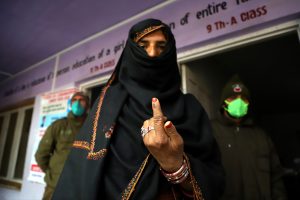Results of the first District Development Council (DDC) elections in Jammu and Kashmir (J&K) have gone along expected lines.
India’s ruling Bharatiya Janata Party (BJP) was predicted to do well in its traditional stronghold in the Jammu region and the People’s Alliance for Gupkar Declaration (PAGD), a platform of seven Kashmiri parties, was expected to dominate the Kashmir Valley. The BJP and the PAGD dominated in their strongholds as predicted.
Overall, it was the PAGD that won the elections. The alliance secured the most number of seats – 110 of the 280 seats that were up for grabs in J&K. It will run 13 of the 20 district councils.
The BJP has claimed victory in the elections too. Party leaders have pointed out that with 75 seats, it emerged the largest single party in the elections. It also won the largest share of votes across J&K.
The BJP is also celebrating its victories in the Muslim-dominated Kashmir region, where it won three seats. This is the first time that the Hindu nationalist party, which favors muscular policies on Kashmir, has managed to make electoral inroads in the valley.
However, its jubilant claims seem based on exaggerated perceptions and projections.
The BJP may be the largest single party, but the 75 seats it won puts it at a distant second in the electoral race. It is the PAGD that will control the majority of district councils.
The larger vote share compared to the PAGD too is largely due to the relatively low turnout in the Kashmir region. The BJP’s wins in its stronghold, Jammu, were not that impressive either; the party struggled to win in constituencies where BJP heavyweights campaigned.
The inroads it appears to have made in Kashmir are in fact marginal. The three seats it won in the valley were secured with narrow margins; the BJP’s Minha Lateef won the Kakapora seat in Pulwama by a margin of just 14 votes.
Although elections to local bodies rarely attract country-wide attention, the recent DDC elections in J&K were different. The campaigns were fiercely fought and closely watched. It was so important to the BJP that the party deployed a phalanx of senior ministers to campaign for a local election.
The elections’ importance stemmed from the fact that it was the first to be fought along political lines since August 2019, when Prime Minister Narendra Modi revoked J&K’s autonomy and divided the former state into two Union Territories – Jammu and Kashmir, and Ladakh.
Following this decision, which brought J&K under New Delhi’s direct rule, the Modi government took a series of highly controversial steps in the Valley. Hundreds of Kashmiri political leaders, activists, and civilians were detained for months on end. The government clamped down on protests and any kind of political activity in the Valley, silenced dissent, and shut down the internet.
These measures evoked immense anger and sullen resentment in the valley.
The DDC elections were therefore widely seen to be a barometer of the public mood in J&K. It was therefore important for the BJP to do well in the election.
Although the DDCs are mandated to deal with development, issues like water and electricity did not figure in the election campaign. The abrogation of J&K’s autonomy was the key issue on which people voted. It was this issue that brought together the constituent parties of the PAGD as well.
Indeed, the PAGD fought the DDC election on the issue of reinstatement of J&K’s autonomy and this it clearly won, especially in the valley.
What makes the PAGD’s victory in the recent elections more impressive is that they won against the odds. Several of its candidates were prevented from campaigning freely.
Kashmir has used the DDC elections to send out a political message to the Modi government: J&K’s autonomy must be restored. Will New Delhi heed that message?
The BJP may not have won the DDC elections, but it did take the right step in holding the elections. The DDC polls represent the first step toward reviving the political process in J&K. The Modi government must follow up on that step by holding assembly elections for J&K soon.

































